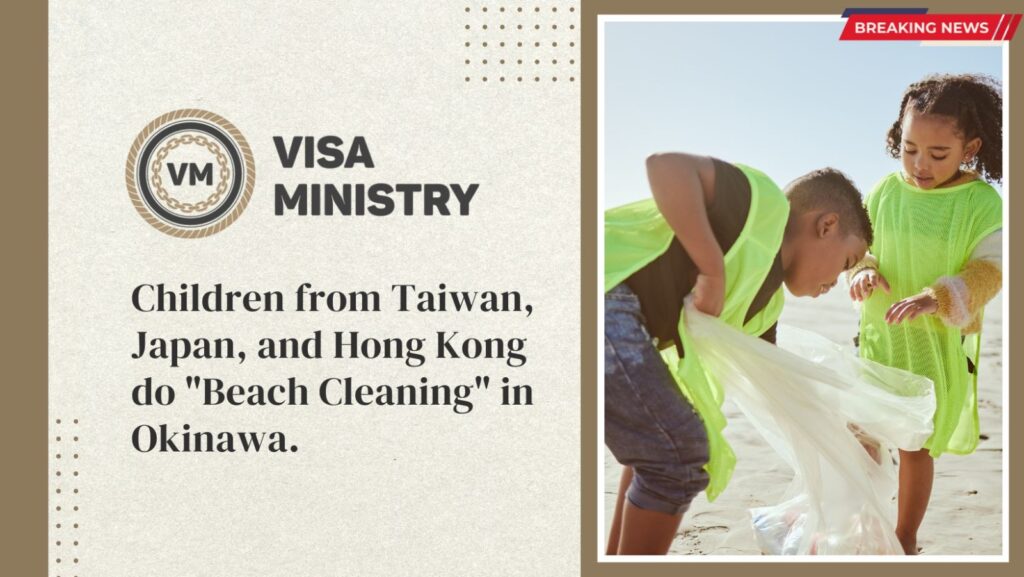Children have shown a particular interest in talking about environmental issues in Japan because the Japanese government may be releasing nuclear wastes. In order to experience the ocean before it is tainted by nuclear pollution, they have also participated in beach cleanup initiatives.
Children from Hong Kong, Japan, and Taiwan came together to clean the Okinawa beach, which has not yet been contaminated by nuclear waste, during a beach cleanup event that the JCI North District specifically arranged from August 10 to August 14. The program was spearheaded by JCI North District President Raymond Lai. The natural beaches of Okinawa were covered in trash after being hit by two typhoons. After realizing that nuclear waste could soon pollute the ocean, the kids became passionate about environmental protection, focusing not only on beach and mountain clean-up but also on marine litter and conservation.
Hong Kong’s aquatic ecosystem is valuable but currently polluted by trash. To preserve this maritime ecosystem, which has exceptional biological value, we must act.
On May 28, we conducted the “Nature Rangers – Clean Up Fun Dive” event, and we invited Mr. Chan Tin-Ming MH, a very well-known ghost net hunter, to take part in this chance to enjoy the lovely ocean while they still could. Along with actively scrubbing the beach, the kids also went to the DMM Kariyush aquarium to learn more about marine ecology and the value of conservation.
In addition to cleaning the beach, the 5-day, 4-night “International Children’s Cultural Exchange Camp” gave the kids a chance to leave Hong Kong and interact with kids from other countries, such as Taiwan, China, and Japan. The agenda includes trips to the Ogimi Shiikuwassa Park and the Ryukyu Cultural Village. The kids gained knowledge of colonial history and Japanese culture while learning about environmental preservation.
The “International Children’s Cultural Exchange Camp” brought together 14 kids from three different locations to learn about and share cultures.
“I am concerned about the potential harm that could be brought about by the discharge of nuclear wastewater,” said Raymond Lai, president of The JCI North District. Even more harmful than marine trash, this might have a significant influence on the marine ecosystem. We discussed our ideas with the Naha JCI Japan, a sister organization, in the hopes of pressuring the Japanese government to halt the release of radioactive effluent. Additionally, we want to clean up Okinawa’s beaches to show that the “Nature Rangers” are dedicated to preserving the environment no matter where they are.
Kayton Ng, an 11-year-old participant, said, “I was able to learn about the traditional culture and arts of the Ryukyu Kingdom as well as its history thanks to the International Children Cultural Exchange Camp.” It made it easier for kids to comprehend the essence of crafting. He thought the trip would have a significant impact on his future development. Kayton continued, “It was the first time I participated in cleaning work for a beach in Japan, and I am adamant that environmental conservation is a global issue rather than just a personal concern. The same duties apply to all global villagers.
Tierra Wong, a participant, stated, “This International Children’s Cultural Exchange Camp has allowed me to see the culture of Japan (mainly Okinawa) and met new friends from Japan, Taiwan, and Hong Kong.”
“I want to express my gratitude to our teachers for taking great care of me and making me feel safe throughout this journey,” participant Charmaine Ng said. I also like to thank the organizers for all their hard work. I wouldn’t have been able to travel to Japan on such a pleasant and thrilling vacation without your devotion and hard work. I just want to say from the bottom of my heart, THANK YOU. This trip will have a particular place in my memories forever.
Not only was this trip a chance for cultural interaction, but it was also a chance to learn about the Sustainable Development Goals of the United Nations. It sought to raise the kids’ knowledge of clean water and environmental protection while also working together to find answers to world problems. We sincerely hope that the Japanese government will pay attention to our concerns, consider how best to grow the world sustainably, and promptly stop releasing nuclear wastes into the ocean in order to protect marine life. This is what moral beings ought to do!
Source- Travel dailyLink- https://www.traveldailymedia.com/children-from-hong-kong-japan-and-taiwan-conduct-beach-cleaning-in-okinawa/
